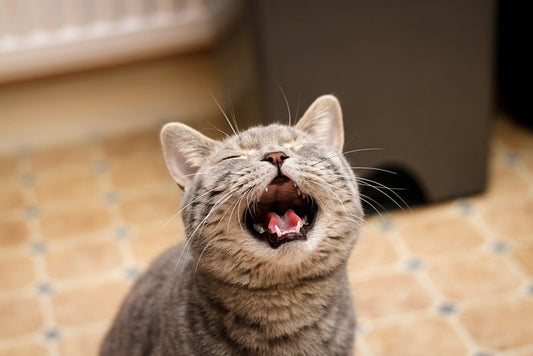
Why Do Cats Meow So Much? Understanding Feline Communication
Share
Cats are known for their vocal personalities, but if you’ve ever asked yourself, “Why does my cat meow so much?” you’re not alone. Meowing is one of the primary ways cats communicate with humans—and understanding the reasons behind it can help strengthen your bond with your feline friend.
In this article, we’ll explain the most common reasons for excessive cat meowing, from attention-seeking behavior to medical issues, and when it may be time to consult a veterinarian.
Why Do Cats Meow? The Basics of Cat Communication
Unlike dogs, cats don’t meow much at each other once they’re grown. Instead, meowing is largely reserved for human interaction. Over time, cats learn that meowing grabs our attention, whether it’s for food, play, or affection.
Key Point: Adult cats primarily meow at humans—not other cats.
Common Reasons Cats Meow So Much
1. Seeking Attention
Cats are intelligent and quickly learn that vocalizing gets results. Excessive cat meowing may simply mean your pet wants interaction—petting, playtime, or acknowledgment.
2. Expressing Basic Needs
Your cat may meow to signal hunger, thirst, or the need to go outside. If your cat is hovering around the food bowl or door while meowing, it’s usually a clear message.
3. Stress and Anxiety
Changes in a cat’s environment—like moving homes, introducing a new pet, or altering daily routines—can lead to anxious vocalization. Recognizing stress-related meowing is key to helping your cat feel secure.
4. Medical Concerns
Sometimes, meowing can be a sign of pain, illness, or other health issues. For senior cats, conditions like cognitive dysfunction may cause increased vocalization. If your cat’s meowing is sudden, excessive, or unusual, consult a vet right away (PetMD).
5. Boredom and Lack of Stimulation
Indoor cats without enough toys, climbing spaces, or enrichment may meow excessively out of boredom. Providing scratching posts, puzzle feeders, or regular playtime can reduce this behavior.
6. Mating Behavior
Unspayed or unneutered cats often vocalize loudly when in heat or searching for a mate. Spaying and neutering can significantly reduce this type of excessive meowing (ASPCA).
7. Age-Related Vocalization
Older cats may experience confusion, dementia, or disorientation, leading to frequent nighttime meowing. If your senior cat is suddenly more vocal, a vet visit can rule out medical concerns.
Why Does My Cat Meow So Much at Night?
Nighttime meowing is one of the most common complaints from cat owners. Reasons include:
- Hunting instincts waking them up during the night
- Boredom or lack of daytime activity
- Hunger or wanting access to closed-off rooms
- Age-related confusion in older cats
Tip: Engage your cat with evening play sessions and feed them before bed to reduce nighttime vocalization.
When to See a Veterinarian
If your cat’s meowing is:
- Sudden or out of character
- Excessive and disruptive
- Accompanied by other symptoms (changes in appetite, lethargy, aggression)
…it’s time to schedule a veterinary visit. Vocalization can be an early sign of underlying medical issues.
Final Thoughts
Cats meow for many reasons—attention, needs, stress, or even medical concerns. Understanding these cues is part of responsible pet care and deepens the human-cat bond. If you’re ever in doubt, don’t ignore sudden changes in vocalization—your cat could be trying to tell you something important.






